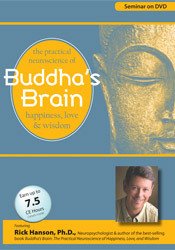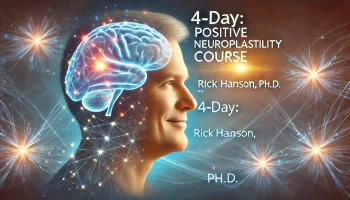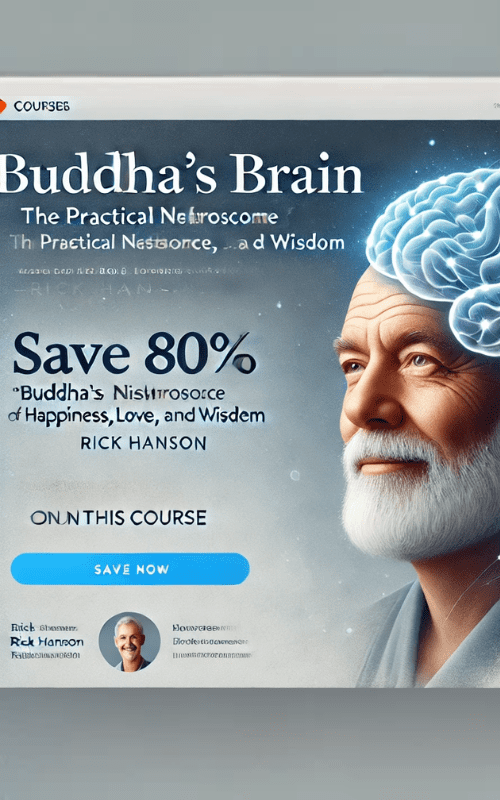Buddha’s Brain -The Practical Neuroscience of Happiness, Love and Wisdom – Rick Hanson
Buddha’s Brain -The Practical Neuroscience of Happiness, Love and Wisdom – Rick Hanson has the same quality as the author’s salapage.
Overview
Salepage check: Buddha’s Brain -The Practical Neuroscience of Happiness, Love and Wisdom
Author: Rick Hanson
- Faculty:
- Rick Hanson
- Duration:
- 6 Hours 3 Minutes
- Format:
- Audio and Video
- Copyright:
- May 23, 2013
Description
Featuring Rick Hanson, Ph.D.
Neuropsychologist & author of the best-selling book Buddha’s Brain: The Practical Neuroscience of Happiness, Love and Wisdom
- 4 steps to internalize positive experiences and heal pain and dysfunction
- Learn from the “Olympic athletes” of brain training (lessons from 2,500 years of contemplative practice)
- Understand the brain’s negativity bias, the greatest challenge in psychotherapy
- Work with the brain’s 3 motivational systems (Approach, Attach, Avoid)
- Strengthen the neural circuits of contentment, belonging and peace
- Teach clients self-directed neuroplasticity
Today’s unprecedented meeting of modern brain science and ancient contemplative wisdom offers you powerful new tools for changing the neural wiring and neurochemistry of the brain.
In this seminar, learn how to use contemplative neuroscience in down-to-earth ways to…
- Weave positive experiences into the fabric of the brain and self
- Stimulate and strengthen the neural circuits of empathy
- Help clients become more mindful
Handouts
| Manual (2.2 MB) | 36 Pages | Available after Purchase |
Outline
The Promise of Self-Directed Neuroplasticity
- How the mind changes the brain
- Lessons from 2,500 years of meditative practice
- Neural circuits of self-compassion
- Getting on your own side
- Virtue, mindfulness and wisdom—resting on the neural functions of regulating, learning and selecting
The Challenge of Evolution
- Chasing carrots and dodging sticks
- The negativity bias of the brain
- How that bias undermines psychotherapy
The Power of Implicit Memory
- Memory systems, explicit and implicit
- The importance of inner resources
- Factors of neuroplasticity
Taking in the Good
- Turning good facts into good experiences
- Savoring positive emotions and perspectives
- Priming implicit memory systems
- Working with children
- Why it’s good to feel good
- Living gratefully
Clearing Old Pain
- Exploiting the “weak link” in memory consolidation
- Pairing positive experiences with old pain
- Special considerations for trauma
Natural Happiness
- The resting state of the brain: Calm, contented, caring
- The brain’s three motivational systems: Approach, Attach, Avoid
- The reactive mode of greed, heartache and hatred (broadly defined)
- How to build up the neural circuits of the responsive mode of gladness, love and peace
Faculty

Rick Hanson, Ph.D. Related seminars and products: 13
Rick Hanson, Ph.D., is a psychologist, a Senior Fellow of the Greater Good Science Center at UC Berkeley, and a New York Times best-selling author. His books are available in 28 languages and include Buddha’s Brain (New Harbinger, 2009), Just One Thing (New Harbinger, 2011), Hardwiring Happiness (Harmony, 2016), Resilient (Harmony, 2018), Just One Thing Card Deck (PESI, 2018), and Mother Nurture (Penguin, 2002). He edits the Wise Brain Bulletin and has numerous online programs. A summa cum laude graduate of UCLA and founder of the Wellspring Institute for Neuroscience and Contemplative Wisdom, he’s been an invited speaker at NASA and Google, and Oxford, Stanford, Harvard, and other major universities, and taught in meditation centers worldwide.
Dr. Hanson has been a trustee of Saybrook University, served on the board of Spirit Rock Meditation Center, and was president of the Board of FamilyWorks, a community agency. He began meditating in 1974, trained in several traditions, and leads a weekly meditation gathering in San Rafael, California. His work has been featured on the BBC, CBS, and NPR, and over 140,000 people receive his free Just One Thing weekly newsletter.
He enjoys rock-climbing and taking a break from emails. He and his wife have two adult children.
Speaker Disclosures:
Financial: Rick Hanson is in private practice. He receives a speaking honorarium from PESI, Inc.
Non-financial: Rick Hanson has no relevant non-financial relationship to disclose.
Curriculum
FAQs
Requirements
- Prerequisites: No prior knowledge of neuroscience or psychology is required.
- Technical Needs: A device with internet access to view digital course materials.
- Materials: Note-taking tools for personal reflection and practice.
Features
- Comprehensive Content: In-depth exploration of how mental practices can change the brain to foster happiness, love, and wisdom.
- Practical Applications: Techniques and exercises to apply neuroscience principles in daily life.
- Expert Instruction: Guidance from Rick Hanson, a renowned neuropsychologist and meditation teacher.
- Flexible Learning: Self-paced digital format accessible anytime, accommodating various schedules.
Target audiences
- Professionals: Therapists, counselors, and mental health practitioners seeking to integrate neuroscience with contemplative practices.
- Individuals: Anyone interested in personal development, mindfulness, and understanding the brain's role in happiness and well-being.
- Educators: Teachers and trainers aiming to incorporate neuroscience-based strategies into their curriculum.



